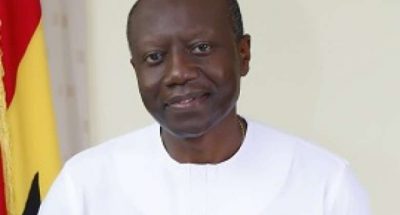Ghana has reaffirmed its readiness to leverage its natural resources to fund a sustainable transition to a low carbon economy, Ken Ofori-Atta, Fin
Ghana has reaffirmed its readiness to leverage its natural resources to fund a sustainable transition to a low carbon economy, Ken Ofori-Atta, Finance Minister has said.
This follows Ghana’s launch of its updated Nationally Determined Contributions (NDCs) at the just ended United Nations Climate Change Conference COP26, in Glasgow, Scotland.
“This will be done by facilitating private sector participation in low carbon activities and industries in a manner that generates more jobs for Ghanaians and improves our general wellbeing,” Mr Ofori-Atta announced in Accra when he presented the 2020 Budget and Economic Statement to Parliament on Wednesday.
The NDCs are countries set targets and efforts to reduce national emissions and to adapt to the impacts of climate change.
Ghana’s 47 NDCs involving some 13 adaptation and 34 mitigation measures on climate change requires between $15.5 billion and $9.3 billion of investment to undertake climate interventions from the year 2020 to 2030.
Implementation of the measures are expected to generate absolute greenhouse gas reductions of 64 million tonnes of carbon dioxide-equivalent (MtCO) as well as help avoid about 2,900 premature deaths per annum from improved air quality while creating over one million decent and green jobs, benefiting nearly 38 million people with majority as youth and women.
Mr Ofori-Atta explained that the government was committed to promoting climate adaptation activities, and would be collaborating with the Global Centre on Adaptation, and partner with the African Development Bank, in pioneering solutions on how to build durable infrastructure, and supporting African cities to guard against the impacts of climate change.
“We are also working with the private sector, and with the assistance of the Green Climate Fund, to establish a multi-million-dollar Green Fund to support our climate adaptation interventions.
“We shall, in addition, work with our traditional authorities and districts to issue innovative “mini muni adaptation bonds’ to address the issues of reclamation and re-afforestation in their localities.
The Minister said in the course of the last two decades, Ghana had adopted several policies and programmes aimed at restoring its lost forest.
Between 2002 and 2020, under the National Forest Plantation Development Programme and the Ghana Forest Plantation Strategy, some 588,000 hectares of plantations have been established.
Again, through the Youth in Afforestation Programme, we are committed to reclaiming some 7.6 million hectares of degraded forest and farms lands, the Finance Minister said.
He announced that from the year 2024 and beyond, Ghana aims to reduce emissions by some ten million tonnes of carbon dioxide equivalent in the cocoa-forest landscape, through the implementation of the Ghana Cocoa Forest REDD Programme, one of five ecological landscape-tailored programmes in Ghana’s REDD Strategy.
“Government, through her NDCs in the forestry sector, is committed to supporting the global target of halving emissions by 2030, and attaining neutrality by 2050.
“Ghana is committed to the Forest Agriculture Commodity Trade (FACT) Dialogue process, and she affirms her resolve to support the development and implementation of the FACT Roadmap Actions.
“We are determined to operationalise the Timber Legality Assurance System, as part of the Forest Law Enforcement Governance and Trade process, which will enable us to track wood electronically to ensure that only legally compliant timber is allowed into any market,” Mr Ofori-Atta said.

COMMENTS